Events
Science and Business Finding Each Other: The General Assembly of the Lithuanian Academy of Sciences
22 06 2022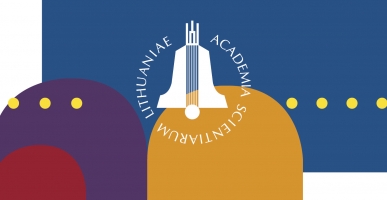
On 21 June 2022, the general assembly of the members of the Lithuanian Academy of Sciences was held. At the beginning of the event, a minute’s silence was observed in memory of the Academy’s foreign members Romualdas Viskanta and Vytautas (Victor) Klemas and the emeritus member Algis Petras Piskarskas.
In his opening address, Prof. Jūras Banys, President of the Lithuanian Academy of Sciences, overviewed the events of the first half of the year. Among the most important ones, he mentioned a positive evaluation of the Academy’s Annual Report for 2021 by the Seimas of the Republic of Lithuania, awards of the Lithuanian Science Prizes at the Academy, and identifying the winners of the L'Oréal-UNESCO ‘For Women in Science’ scholarships. Thanks to the efforts of the members of the Lithuanian Academy of Sciences, a monument to the famous Lithuanian scientist Theodor von Grotthuss was unveiled in Žeimelis (Pakruojis district). The president and the vice-president attended the meetings of the EASAC and the ALLEA abroad. The Lithuanian Academy of Sciences published the monograph ‘Slavonic Chronicles on the Eve of the Formation of Ancient Rus: Animal Husbandry or Hunting’ in Ukrainian and handed it over to the war-torn state. The Academy was the first to declare the resolution on the war in Ukraine. A book on the lessons learned from the Covid-19 pandemic is also planned, as this knowledge will be useful in the future as, sooner or later, new epidemics cannot be avoided.
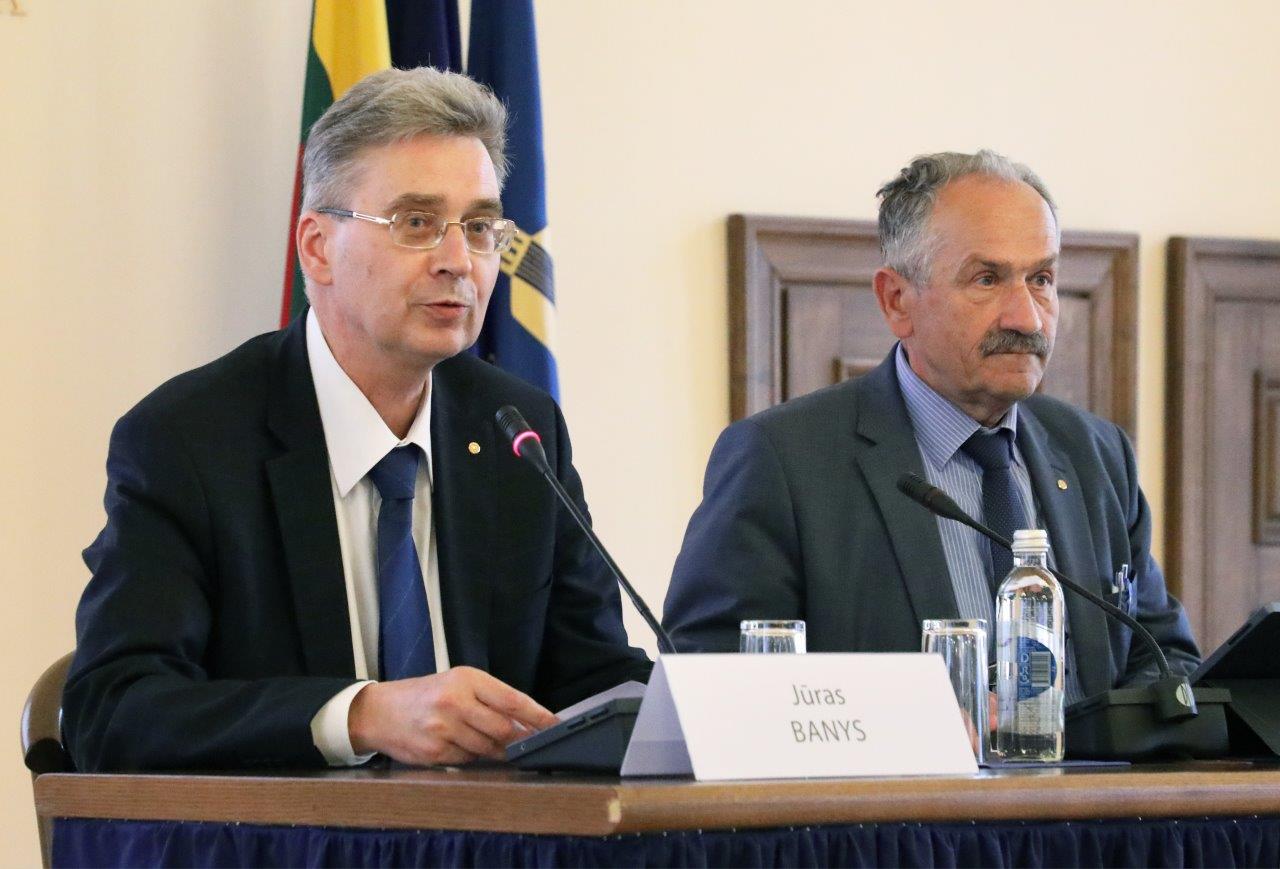
Prof. Jūras Banys, president of the Lithuanian Academy of Sciences (left) and Prof. Zenonas Dabkevičius, vice-president of the Academy
Prof. Banys also pointed out that the agenda for this assembly was successfully selected. This is because strengthening links between science and business is a prerequisite for a country's prosperity, and our country still lacks such close interaction. Gitanas Nausėda, President of the Republic of Lithuania, acknowledged it in his State of the Nation Address to the Seimas on 16 June:
I also welcome the establishment of a joint innovation agency.On the other hand, I need to point out that science and business in Lithuania are still moving along different paths.Without a system for putting scientific achievements into practice, the discoveries made by our scientists will never make it past the office or laboratory doorstep.I would like to remind parliamentary parties of their promise to increase funding for scientific and experimental research. Without additional financial resources, it will be difficult to strengthen collaboration between science and business, promote transnationalism, and expand research competences.I am convinced that education will remain the strongest long-term pillar of Lithuania’s progress, renewal and prosperity.
Letters of Appreciation of the President of the Lithuanian Academy of Sciences were presented to Arvydas Virgilijus Matulionis, the long-standing chair of the editorial board of the journal Filosofija. Sociologija and a member of the Lithuanian Academy of Sciences, and to Prof. Dr Sandra Grigaravičiūtė, a long-time member of the editorial board of the journal Lituanistica. Cordial wishes were extended to academicians Mindaugas Malakauskas, Romualdas Karazija, and Vytas Antanas Tamošiūnas on the occasion of their significant birthdays. Commemorative medals of the Lithuanian Academy of Sciences were awarded to the academician Rymantas Jonas Kažys, to Andrius Bernotas, head of the Academy’s Organising Department, Aldona Daučiūnienė, head of the ‘Palace of Scientists’ division, and Lyda Milošienė, the chief rapporteur.
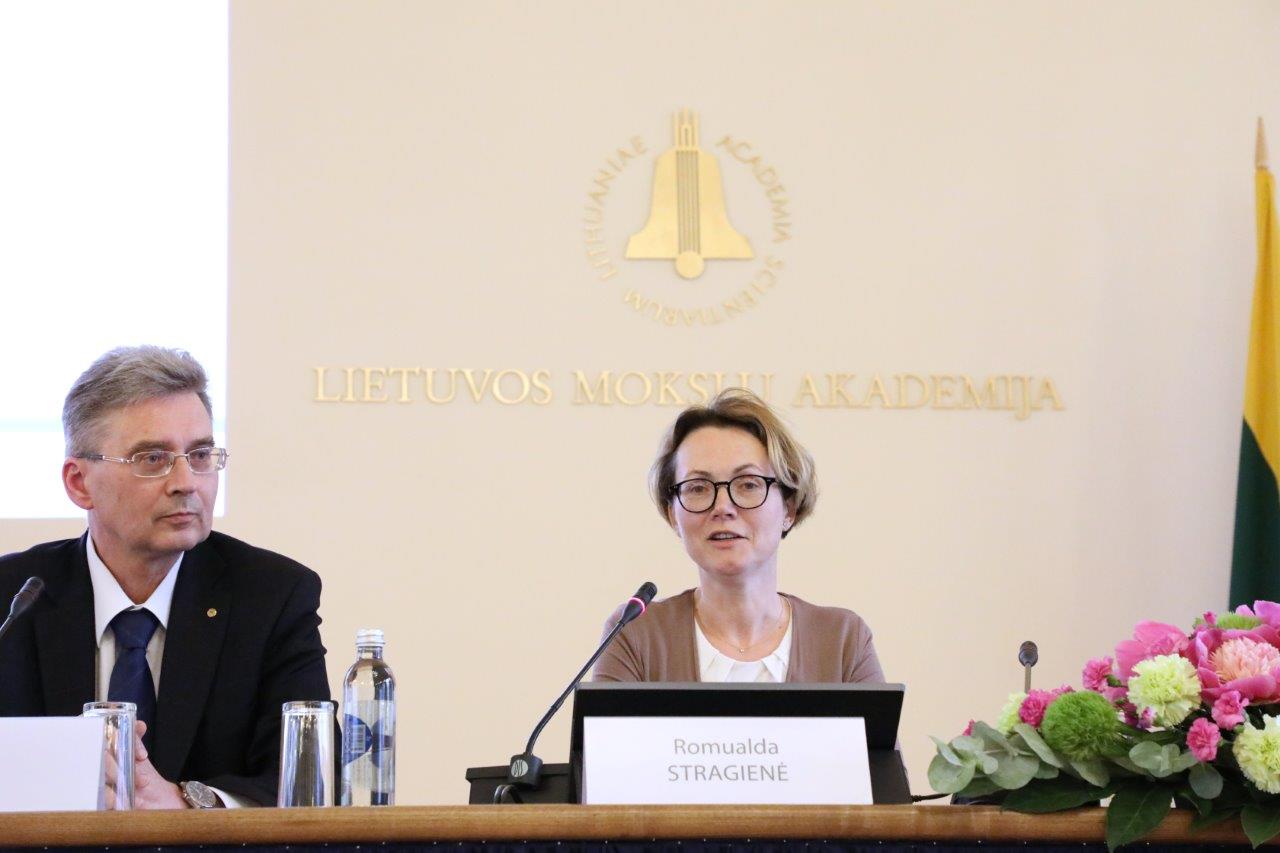
Prof. Jūras Banys and Romualda Stragienė, director of the Innovation Agency
Romualda Stragienė, the recently appointed director of the Innovation Agency, was the first to share her thoughts on the formation and implementation of innovation policy in Lithuania and on the promotion of globally competitive and innovative business in the country. She said the agency, which took over the functions of a number of institutions, would seek synergy and optimisation. The activities of the agency will be based on the one-stop shop principle to concentrate innovation management processes under one roof. As innovation policy is shaped by the Ministry of the Economy and Innovation, the Innovation Agency is its arms and legs. The idea is to create an efficient system for the implementation of innovations. The new agency should become a platform for a broader range of services, making it easier for businesses to find new attractive ideas in the world of science.
Academician Eugenijus Arvydas Janulaitis observed that there were no problems between business and science in biotechnology or laser technology, so we should follow their example and learn from their experience. Vladas Algirdas Bumelis, a member of the Lithuanian Academy of Sciences, added that it was very important to define the concepts precisely and to understand what innovation was and how business would interact with the new agency; otherwise misunderstandings would not be avoided. It is not the interaction between Lithuanian science and business that we need to develop, because there is no Lithuanian science. Rather, between Lithuanian research institutions and business, because science is essentially an international activity.
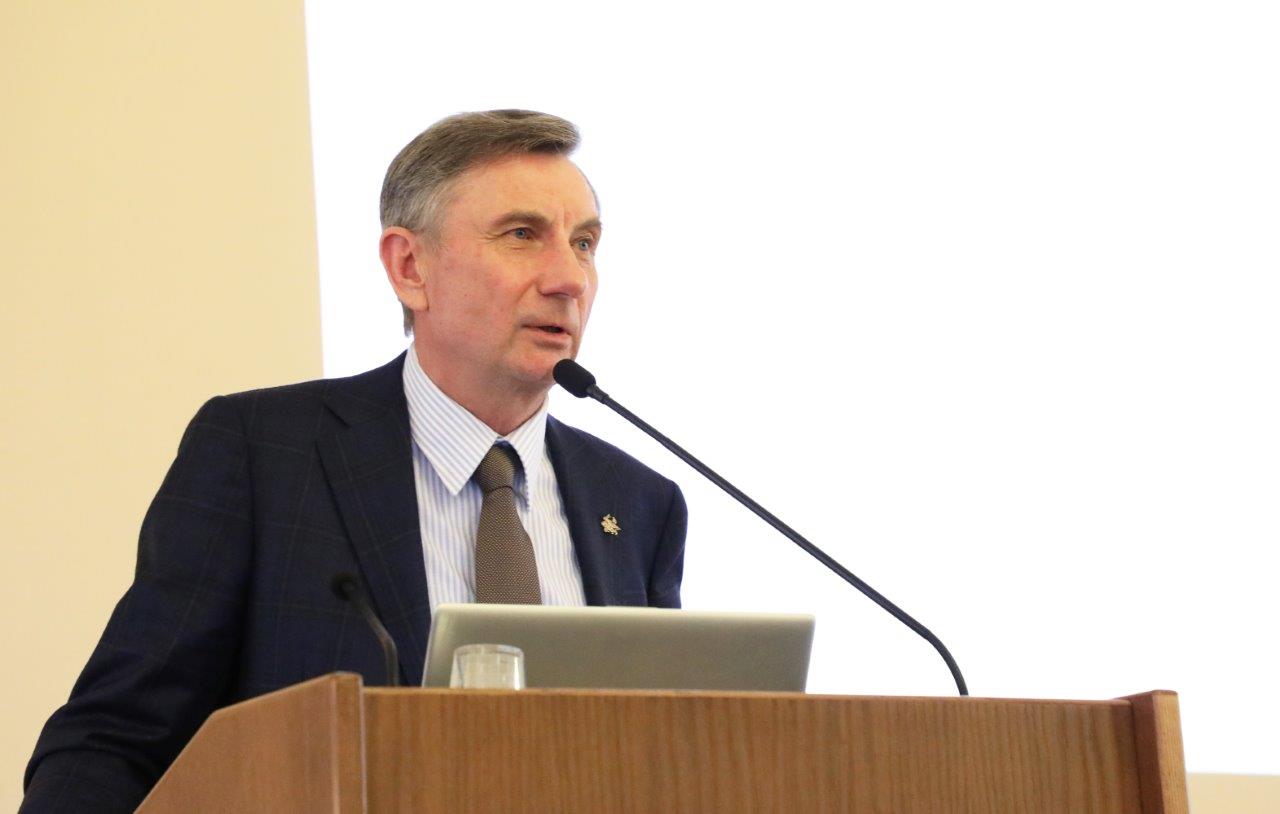
Prof. Romas Baronas, chair of the Research Council of Lithuania
Next to speak was Prof. Romas Baronas, a member of the Lithuanian Academy of Sciences and the chair of the Research Council of Lithuania, who outlined the implementation of the mission of the Research Council of Lithuania. He briefed the audience on the structural and functional changes in the organisation, among the most important of which is the incorporation of a part of the staff of the Agency for Science, Innovation, and Technology into the Research Council of Lithuania. A new Committee of Experts on Research and Higher Education Policy has been established. Prof. Baronas stressed that the experts of the Research Council of Lithuania would make proposals on the financing and development of research-based innovation. Here the emphasis is placed on the research aspect, as scientists approach the research council and business representatives turn to the Innovation Agency.
Prof. Artūras Žukauskas, a member of the Academy and the chairman of the Committee on Education and Science of the Seimas, gave a remote presentation on the latest developments in the Lithuanian research and study system. In his words, the structure of funding for research and education institutions has finally been sorted out and it consists of three blocks: basic, incentive, and strategic funding. Public funding for research and development has increased by 30 per cent, but the goal is to increase this funding to 0.75–1 per cent of the GDP.
The major challenge for the near future is the quality of higher education. This will be addressed primarily by stricter selection. The entrants will therefore have to take three examinations. Another aspect is the changes in the funding of studies: funding for the quality of studies is emerging, student attrition is being legitimised to maintain stability in the finding of higher education. Thirdly, social composition of the students will be taken into account in order to match the structure of society. This would attract more talented and motivated students from different regions of the country who for financial or other reasons have so far not chosen studies in higher education institutions. Expanding the social dimension means that up to 10 per cent of students will be admitted to state-funded places not only on the basis of their grades: their other experiences (employment, army service, volunteering, etc) will also be taken into account.
Finally, Prof. Žukauskas pointed out that the problem of the researcher’s career was also being addressed using models successful in other European countries. Fixed-term contracts will be scrapped and one contract for the first five years will suffice. There will be four levels of competences for researchers; legalisation of practicing researcher positions will allow students to gain employment while studying and to acquire practical skills for working in research laboratories. These changes were long overdue, so it is very good that political parties were able to reach agreement on the main directions of the reform of higher education and research.
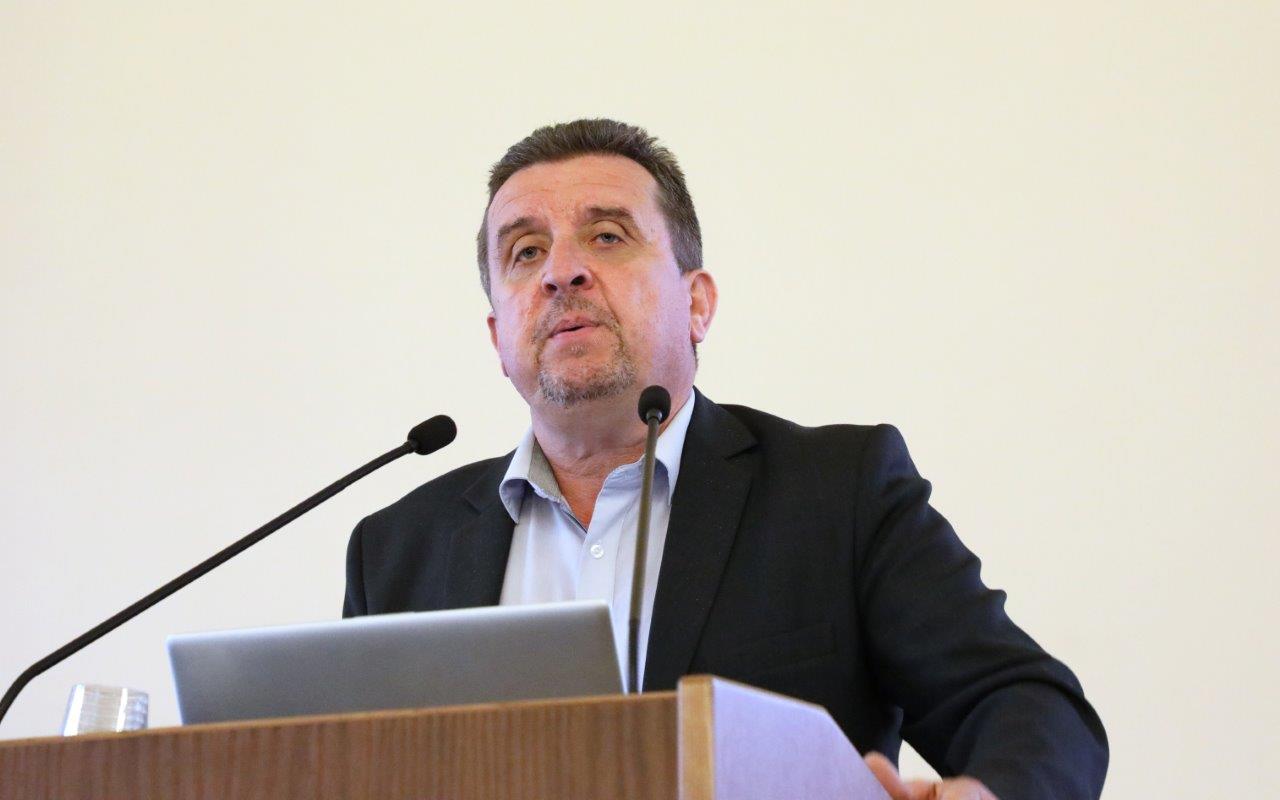
Artūras Jakubavičius, head of the Innovation Support Services Department of the Lithuanian Innovation Centre
Translating scientific ideas into innovative products as efficiently as possible is essential in boosting national competitiveness. Recently, competition among countries has been observed, and Lithuania needs to accelerate this process. Artūras Jakubavičius, head of the Innovation Support Services Department of the Lithuanian Innovation Centre, spoke about cooperation between science and business. He reminded the audience that science is also a knowledge-generating business. One just needs to know how to sell knowledge in a global marketplace where three economic trends have recently become dominant: digital, circular (including ‘green deal’), and silver. All of them are based on objective needs. Such as the need to reduce environmental pollution and climate change, to use natural resources as efficiently as possible, or to increase productive efficiency in the face of an ageing population and related labour shortages. Business could indeed work more closely with scientists, because the need for innovation in these particular areas is rapidly growing. Could it be that there is a lack of supply? It seems that research institutions need to be more inventive and efficient in selling or marketing their products with the help of the new innovation agency. However, Artūras Jakubavičius noted that although we have all the necessary elements of the innovation-promoting system, the links between them are not well established. Establishing them is vital.
This idea was seconded by the academician Gintautas Žintelis, who confirmed the chaos he had experienced while attending meetings of the Committee for the Future at the Seimas. He, too, is surprised by such an inability to rally forces and interests, to act coherently and effectively. The presentations and the discussion were aptly summarised by Danukas Arlauskas, president of the Lithuanian Confederation of Employers: he quoted Steve Jobs who said that those businesses will survive which are engaged in technology married with liberal arts. Since innovations and new ideas are usually born at the intersection of different fields, it is also important for Lithuania not to be distracted but to look for a way to find future-creating businesses at the intersection of different sciences and technologies, and perhaps even art.
Dr Rolandas Maskoliūnas, chief specialist for public relations
Translated by Diana Barnard
